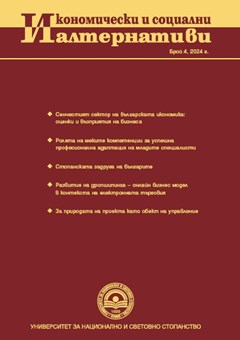Ролята на меките компетенции за успешна професионална адаптация на младите специалисти
Автор: Никола Танаков
Резюме
The article aims to present the results of the author’s up-to-date independent research on the soft competencies, also known as “soft skills”, which occupy a central place in the context of the successful professional adaptation of students in the conditions of the ever[1]changing and highly competitive market of labor. It was carried out in February-March 2024 as a survey among business representatives and students in the country through a representative sample of 60 enterprises and 150 students. Although the emphasis in career development has traditionally been on technical knowledge and specific professional expertise, the growing importance of skills such as effective communication, emotional intelligence, teamwork, leadership and strategic problem-solving skills underscores the need for a comprehensive understanding of the process of adaptation. This article offers an in-depth analysis of the role of soft competencies in the transition from an academic to a professional environment, exploring their impact on the ability of young professionals to integrate effectively into organizational structures and meet the high demands of the modern business environment. Through a systematic review of theoretical concepts and empirical research, key soft skills that have a direct relationship to professional adaptation, as well as methodologies for their purposeful development in the educational process are identified. In conclusion, the article emphasizes that the acquisition and application of soft competences is an essential condition not only for the initial adaptation, but also for the long-term career success and sustainable professional development of young professionals.

